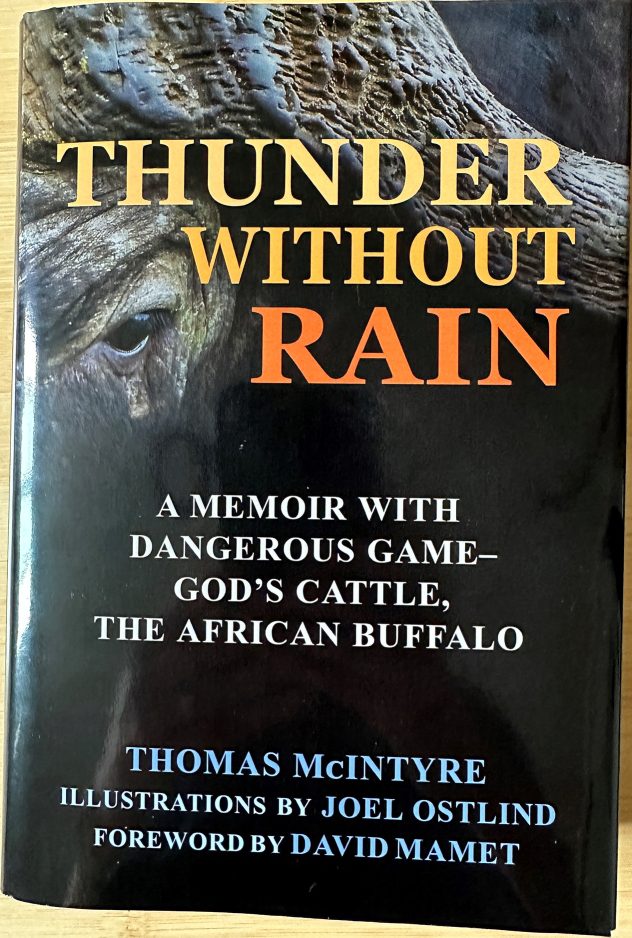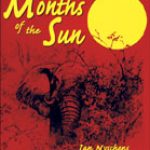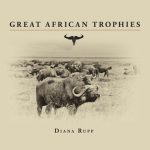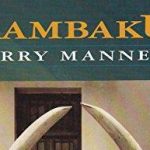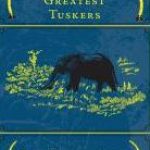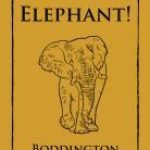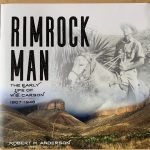Thomas McIntyre’s last book is truly his magnum opus.
Thunder without Rain: A Memoir with Dangerous Game–God’s Cattle, the African Buffalo is Thomas McIntyre’s last book, completed shortly before his death in November 2022 and published by Skyhorse Publishing this spring. The title comes from a saying by the Yoruba, the natives of the region that is now Nigeria, Benin, and Togo: “When you hear thunder without rain, it is the buffalo approaching.”
The buffalo is central to the cultures and traditions of many Africans, and it can also become a powerful influence in the lives of people like the author who travel to Africa to hunt it. This is not a book that is easily categorized. As the author says in the Preface, it’s not a natural history, biography, scientific treatise, or literary essay, although it contains elements of all of those things. It is, in fact, a memoir, albeit an unconventional one.
From the time he first set eyes on a mounted buffalo head at the age of four, McIntyre’s entire life was profoundly influenced by his ongoing quest for Syncerus caffer. That head sparked far more than just the desire to travel to Africa–it set him on a lifelong search for what makes the African buffalo so compelling. He takes us along as he seeks the buffalo not just in the physical environs of Africa but also in history, science, literature, art, and tradition. He shares the fruits of this quest with us in this powerful and fascinating book.
There is plenty of hunting action in Thunder without Rain; the author includes vivid descriptions of segments of his safaris in Kenya, Zimbabwe, Central African Republic, and Burkina Faso over a space of fifty years. Between and related to the safari stories is an incredible amount of wide-ranging and well-researched information about the buffalo and its effects on humankind, reaching back through archeological exploration and colonial settlement. The author discusses how buffalo affected and influenced other hunters, including such famous names as Samuel Baker, Frederick Selous, and Theodore Roosevelt.
McIntyre’s safari memories are interspersed with reflections on his childhood, especially his troubled relationship with his father. The effects of his African experiences on the rest of his life come through potently in McIntyre’s retelling, as he finds solace and meaning in treading the game trails of Africa. Grappling with the demons of his childhood also sparks thoughts on the meaning of courage, and the facing of a buffalo charge as a metaphor for gaining the fortitude to embrace life is a recurring theme throughout. Courage is also required as the author bears witness to changes beyond his control that negatively affect the continent of Africa and its wildlife, including his beloved buffalo.
A full third of Thunder without Rain consists of Endnotes. You don’t have to read them to enjoy the book, but I suggest you spend some time paging through them, since they add interesting and amplifying information to the rest of the text.
I had the privilege of editing Thomas McIntyre’s Backcountry column in Sports Afield magazine for many years, and I always admired the depth of his writing, the amazing breadth of his knowledge, and his meticulous research. But the magazine article format is rather limiting, and McInytre was always at his best in his many excellent books, where he had the free rein to really delve into his topic.
It’s possible he knew Thunder without Rain might be his last book. It’s been called, accurately, his magnum opus. It’s a deep dive into the essence of the African buffalo and the search for what it means to live a full and true life, a life that for the author was deeply enriched by his experiences with one of Africa’s premier dangerous game animals.
If you have your own fascination with buffalo, Africa, and all things wild, you should read Thunder without Rain. It’s available from Amazon.com and other booksellers.

